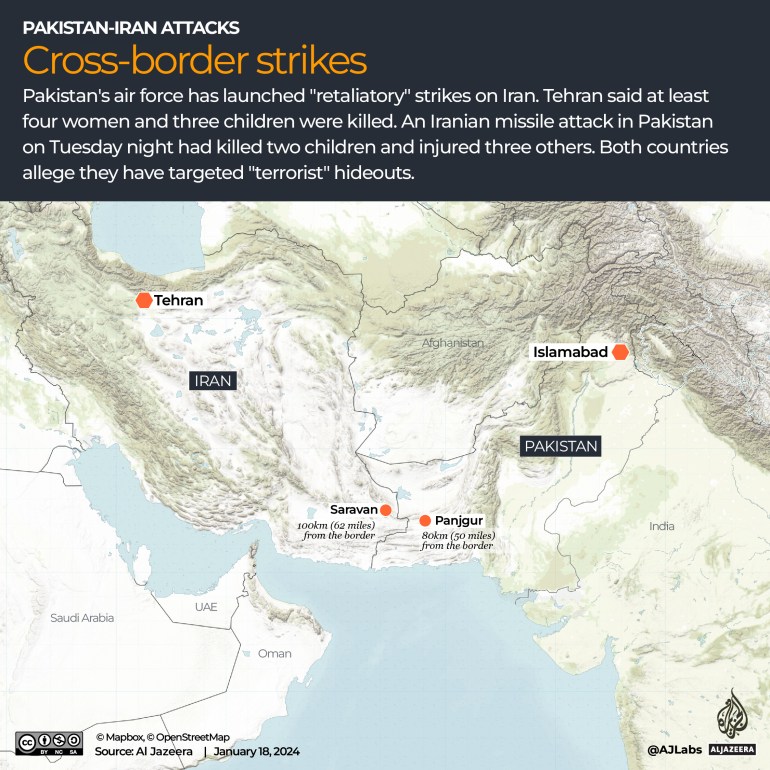Pakistan and Iran’s foreign ministers emphasised ‘brotherly relations’ during a phonecall on Friday, Islamabad said.
Pakistan and Iran have agreed to “de-escalate” tensions after an exchange of missile and drone attacks this week raised fears of further instability in the region, Islamabad said.
Pakistan’s Foreign Minister Jalil Abbas Jilani and the foreign minister of Iran, Hossein Amir-Abdollahian, spoke via phone on Friday, Pakistan’s foreign ministry said in a statement.
“The two foreign ministers agreed that working level cooperation and close coordination on counter terrorism and other aspects of mutual concern should be strengthened. They also agreed to de-escalate the situation,” the statement read.
“The return of ambassadors of the two countries to their respective capitals was also discussed,” it added.
Al Jazeera’s Osama bin Javid, reporting from Islamabad, said there has been “a lot of diplomacy in the last 24 hours from both sides” to try and come out of the growing tensions.
“For the first time, we’re seeing both countries’ militaries get involved in what has been a slow-burner proxy war that has continued in these two provinces of Balochistan and Sistan-Baluchestan, and now, as we’ve been hearing from various sources and analysts, things seem to be going back on track towards normalcy.”

National security review
Pakistan’s top military and civilian leaders also conducted a national security review over the situation on Friday, called by Caretaker Prime Minister Anwaar-ul-Haq Kakar, where one source told our correspondent that officials were discussing a resumption of diplomatic ties.
On Tuesday night, Iran carried out a missile and drone attack against the armed group Jaish al-Adl in Pakistan’s southwestern border province of Balochistan, in which two people died. Pakistan in turn struck armed-group targets inside Iran on Thursday.
Pakistan recalled its ambassador from Tehran and said Iran’s envoy – on a visit home – was blocked from returning to Islamabad.
A Pakistani security official said the chief of army staff and head of the intelligence services were attending Friday’s national security review meeting, the AFP news agency reported. Kakar also cut short his visit to the World Economic Forum in Davos, Switzerland, following the attack.
“These areas are problem areas for both Pakistan and Iran, and proxies aligned to both countries have been operating in this region for years now,” Al Jazeera’s Javid said about the current crisis.
“They have carried out tit-for-tat attacks against each other, but the recent developments are unusual as both countries militaries are involved this time around, using ballistic missiles, drones and heavy ammunitions against each other,” our correspondent added.
The tit-for-tat attacks have been the largest cross-border intrusions in recent years and have raised alarm about the potential for wider instability since the war between Israel and Hamas erupted on October 7.
However, both Pakistan and Iran have signalled a desire to calm tensions.
Iran’s Ministry of Foreign Affairs said on Thursday that it was committed to good neighbourly relations with Pakistan but called on Islamabad to prevent the establishment of “terrorist bases” on its soil.
Pakistan issued a similar statement with its Ministry of Foreign Affairs saying that its “sole” reason for the retaliatory attacks was “in pursuit of Pakistan’s own security and national interest, which is paramount and cannot be compromised”.
United Nations Secretary-General Antonio Guterres urged the two countries to “exercise maximum restraint to avoid a further escalation of tensions”.
Guterres “underlines that all security concerns between the two countries must be addressed by peaceful means through dialogue and cooperation in accordance with the principles of sovereignty, territorial integrity and good neighbourly relations,” UN spokesperson Stephane Dujarric said.

Emily Foster is a globe-trotting journalist based in the UK. Her articles offer readers a global perspective on international events, exploring complex geopolitical issues and providing a nuanced view of the world’s most pressing challenges.








